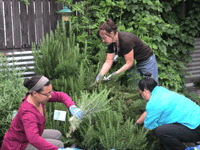 We all know the big ones: leave the car at home, don't waste electricity, and recycle. But, there are many more less obvious, equally simple ways to green your lifestyle. In their article "Being Green: 11 Environmentally Friendly Habits," Scientific American outlines some little-known tips that you can start using today. Here are some highlights:
We all know the big ones: leave the car at home, don't waste electricity, and recycle. But, there are many more less obvious, equally simple ways to green your lifestyle. In their article "Being Green: 11 Environmentally Friendly Habits," Scientific American outlines some little-known tips that you can start using today. Here are some highlights:1. Chemical Decoder
Read the label on your body care products. You're likely to find chemicals in the fine print: "Is polyquaternium-10 safe for you and everything that lives downstream from your shower drain? And why do toothpastes and toilet bowl cleaners share some ingredients?"
For information about the chemicals in household products, cosmetics, and body care products, checkout the Green Media Toolshed’s Scorecard (www.scorecard.org/chemical-profiles/), the Environmental Working Group’s Skin Deep cosmetic safety database (www.cosmeticsdatabase.com) and the National Library of Medicine’s Toxicology Data Network (http://toxnet.nlm.nih.gov).
2. Hand-held Energy Savers
Replace electric-powered with hand-powered tools. Some suggestions: the can opener, coffee grinder, juicer, stick blender, and the electric knife.
3. Go Outside
According to Scientific American, "Sending a kid outside to play can improve his or her concentration and fight climate change. A study published in 2008 by researchers at the University of Illinois found that children with attention-deficit hyperactivity disorder who took walks outdoors raised their attentiveness scores and that kids who walked in natural settings did better than those who walked city streets. A dose of nature was just as effective as a dose of Ritalin. Of course, the more time kids spend playing outdoors the less time they’ll spend at video-game consoles—which consume an estimated 16 billion kilowatt-hours of electricity annually, about four times the output of Hoover Dam."
To read the full length article, click here.












